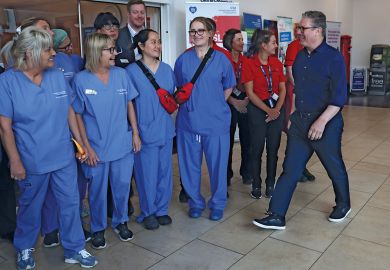University departments are more likely to be headed by non-academics in the future, according to the author of a report on leadership in higher education.
Jonathan Gosling of the Centre for Leadership Studies at the University of Exeter said that distinction in research was not now the primary factor to consider when universities recruit staff for academic management roles. He told Times Higher Education: "Research excellence is no longer enough."
As schools and departments merge and become larger, he explained, their heads have to manage disciplines other than their own. "The people who are most adept at working across boundaries and at managing large projects tend to be administrators," Professor Gosling explained.
His report for the Leadership Foundation predicted a "reframing" of criteria for academic credibility away from research excellence to broader managerial and professional expertise.
Larger departments, schools and faculties are usually headed by an academic and a faculty manager. Increasingly, the balance of power in these departments is tipping towards the managers, he said.
"Traditionally, the credibility of a research post carried into these roles has given the academic the edge. As the importance of sound business management skills and a track record in running things increases, the balance of power is shifting towards administrators."
Professor Gosling also suggested that younger academics appointed to head of department on the basis of Buggins' turn were remaining in management jobs for longer. "In the past, people felt they had to get back to their research or they wouldn't be promoted. Now they stay on."
Professional education departments are already headed by practitioners without long histories in research. Adrian Monck, head of journalism and publishing at City University, had no academic research experience when he took the job, though he had written a non-academic book. "I was made very welcome when I joined and I haven't encountered any snobbery," he said.
"The dean of the school had also come from a background outside of academia."
Sue Robertson was dean of the School of Arts at City University for four years. She was previously chief executive of London Arts and a member of the senior management team at the South Bank Centre.
She said: "I had spent a lot of my time in education. If I hadn't, the role as dean would have been difficult."
Professor Robertson said she was well received by academics. "Nobody was antagonistic. The hardest aspect was working on the course programmes, which has traditionally been the preserve of academics.
"The academic staff are very good at delegating upwards to keep you busy and distracted from the course content. Everybody is very willing for you to solve the contextual problems: fixing the lightbulbs as I call it. The big deal is establishing your right to have a view on how programmes are developed and quality audit."
Register to continue
Why register?
- Registration is free and only takes a moment
- Once registered, you can read 3 articles a month
- Sign up for our newsletter
Subscribe
Or subscribe for unlimited access to:
- Unlimited access to news, views, insights & reviews
- Digital editions
- Digital access to THE’s university and college rankings analysis
Already registered or a current subscriber?



